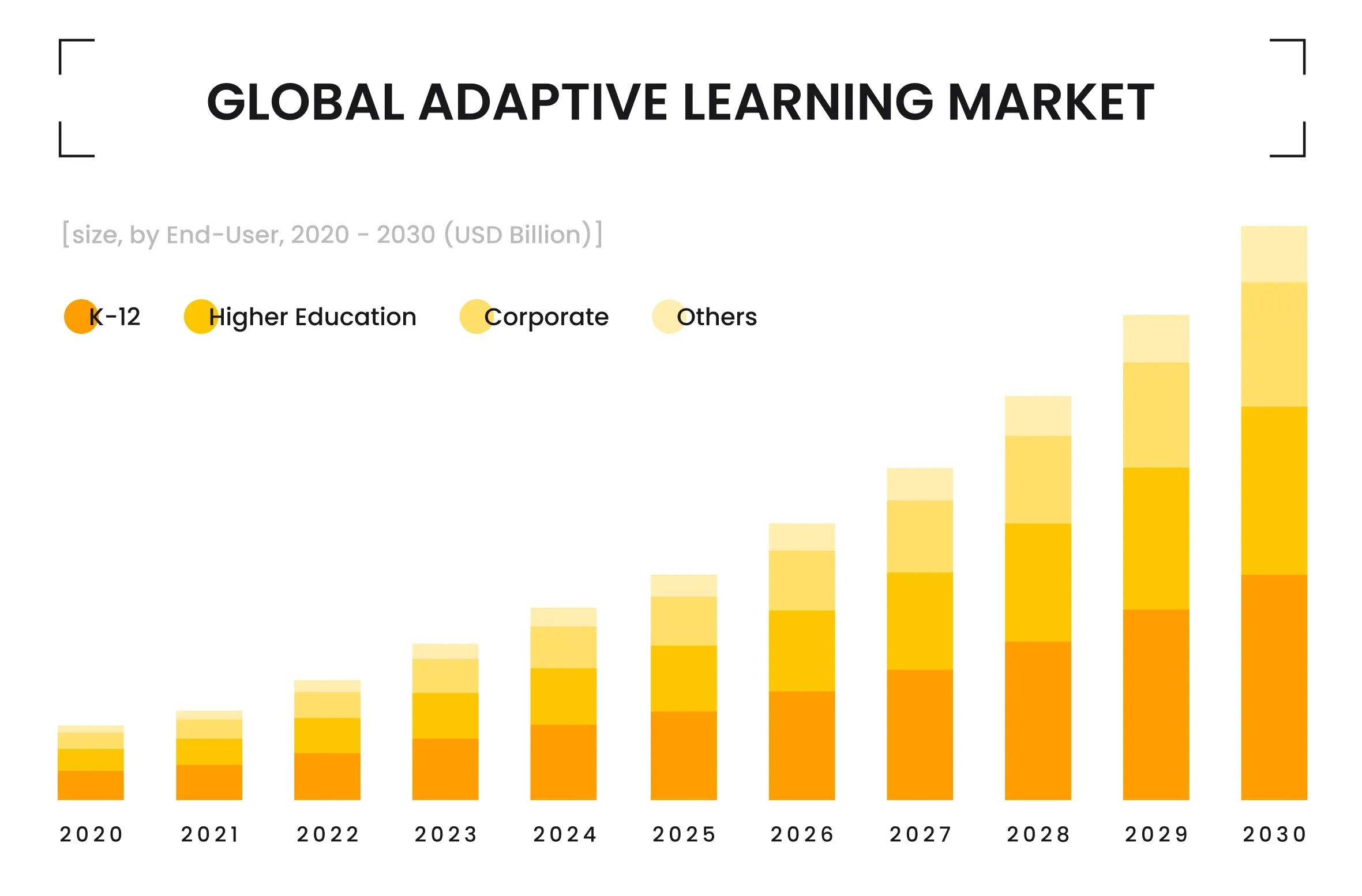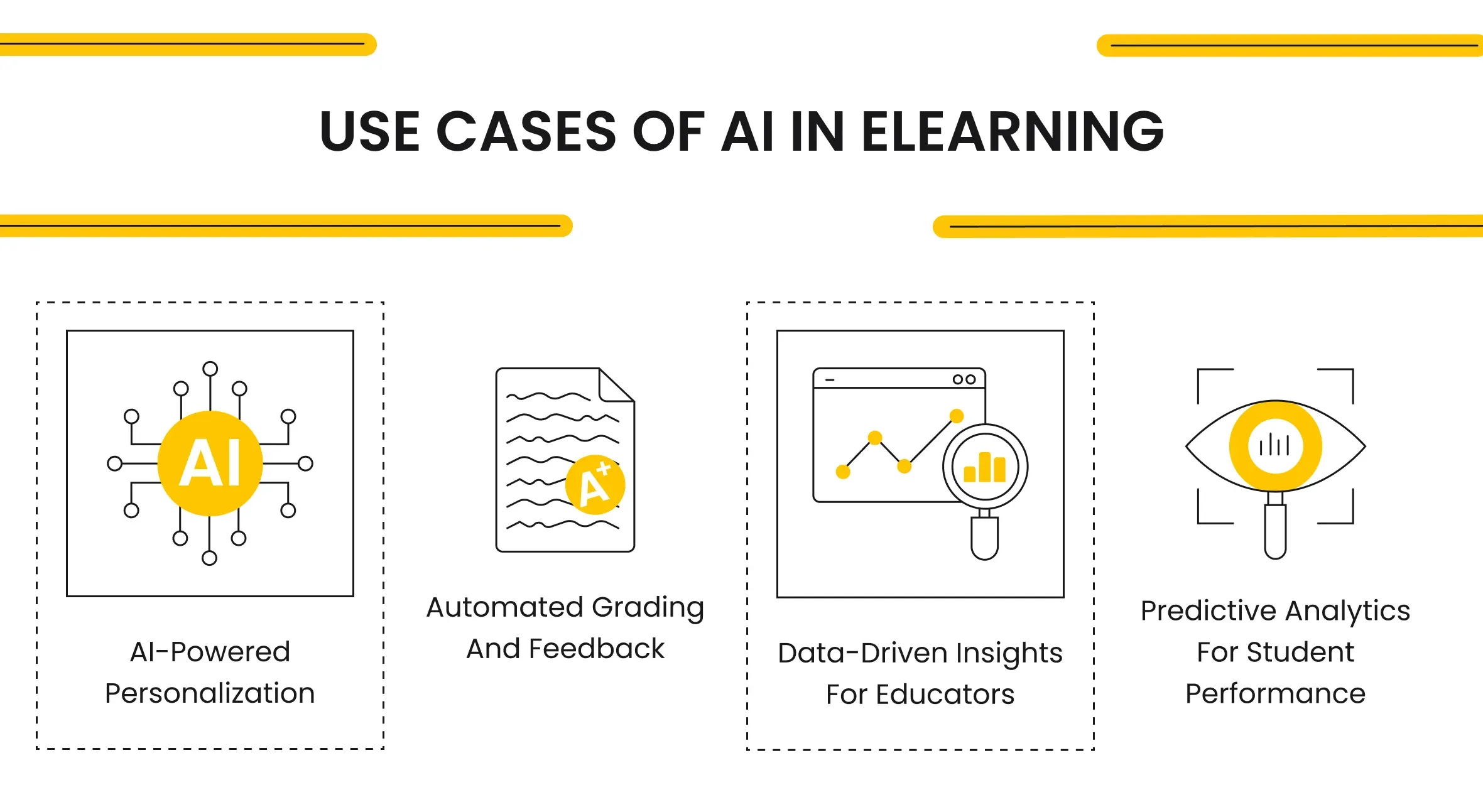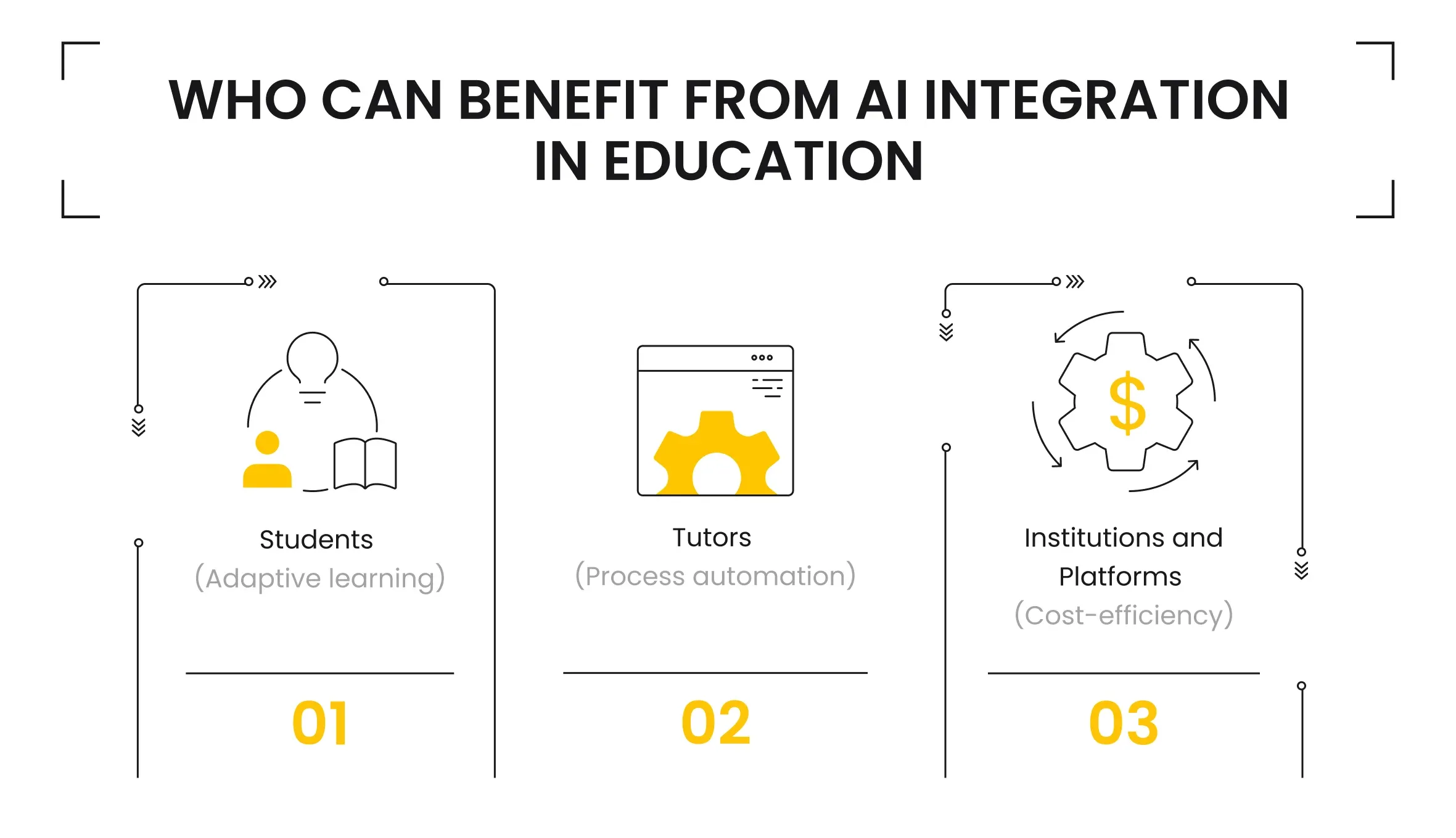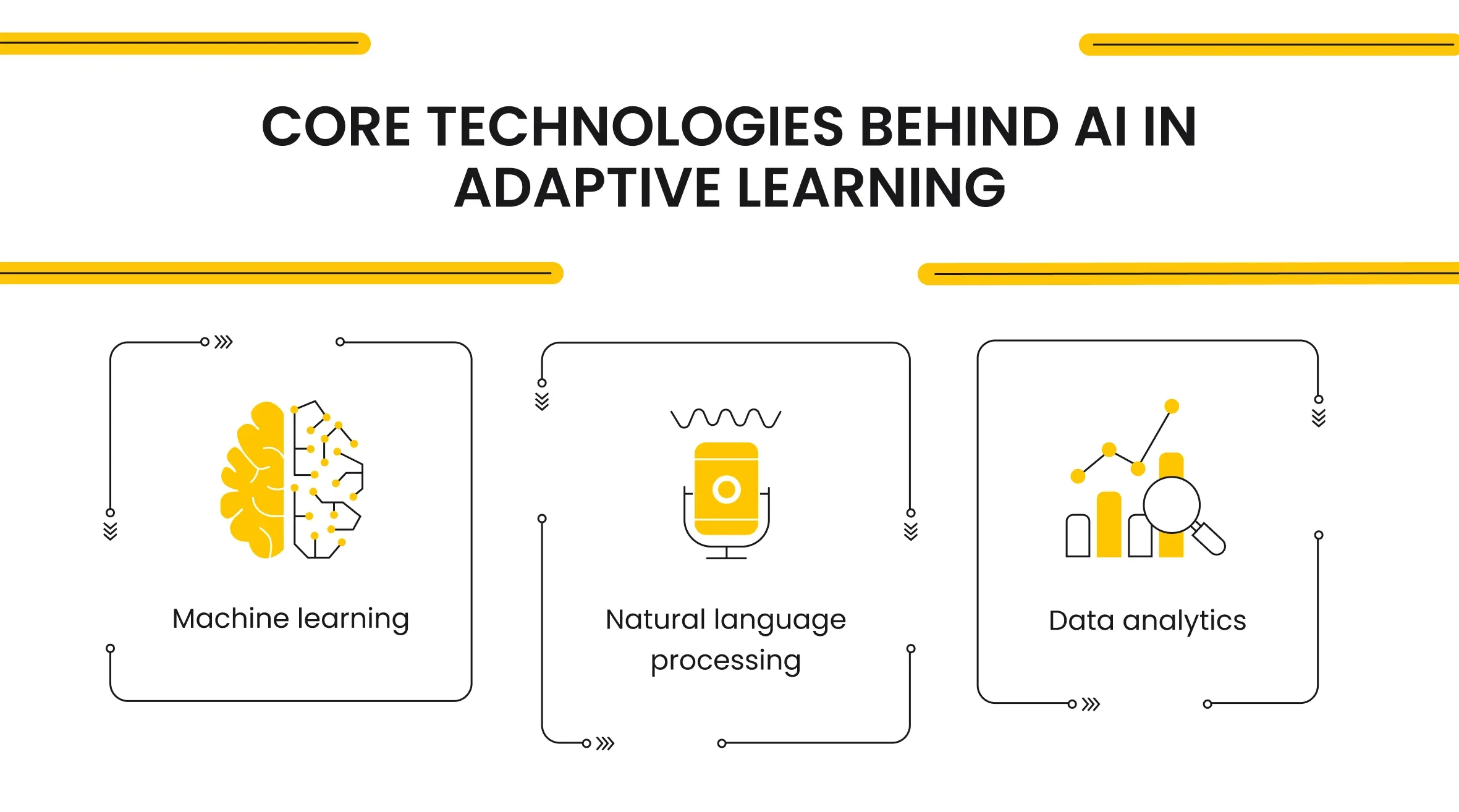EdTech
Why Is AI Integration in Education Key to Adaptive Learning Solutions?
January 24, 2025 • 146 Views • 20 min read
Bohdan Vasylkiv
CEO & Co-Founder
We are already living in the era of artificial intelligence. AI solutions and their integration have become an everyday norm in the modern software industry. AI in eLearning is no exception and has already become one of the most significant eLearning trends.
Today, we would like to examine the core benefits of AI Integration in Education and how it can boost your eLearning platforms, making them more personalized and efficient for the end user. However, before deepening into the AI use cases in the eLearning industry and the advantages it brings, let’s talk about adaptive learning because this niche probably has the highest potential in AI integrations.
The Role of AI in Adaptive Learning
Adaptive Learning in a Nutshell
Before discussing AI in adaptive learning, let’s establish some ground rules and explain this term.
A few years ago, adaptive learning was a buzzword that assumed some ground-breaking approach to the students, making them the central figure in the learning process. However, it was a resource-intensive approach, mainly limited to personal paid tutorship.
Nevertheless, the modem world is rapidly changing, and some new software solutions and overall strategies have switched to personalization, making it more affordable and efficient. To illustrate, the global adaptive learning market is expected to grow at a CAGR of up to 21.4% during 2023-2030.

Long story short, self-education and adaptive learning are growing in popularity and can compete with traditional institutional studies. For example, Harvard University offers free access to many online courses, where users can complete the same curriculum as official Harvard students without needing to pay for their education and even visit the campus. The number of similar offers by various institutions and companies is also rising.
Apart from that, implementing an adaptive learning methodology allows the adjustment of existing courses to provide students with the most efficient and convenient way to learn new information and train essential skills, making the study process more intuitive and personalized.

So, what is the potential role of AI in adaptive learning? By integrating and training artificial intelligence or similar solutions into their platforms, EdTech development companies can significantly upscale the offered services and provide their clients with the most suited and customized approach possible, saving time and resources by automating numerous services. The list of core arguments in favor of AI Integration in education includes the following:
- AI-powered personalization
- Automated grading and feedback
- Data-driven insights for educators
- Predictive analytics for student performance
AI-Powered Personalization
The first and most obvious advantage of using AI in eLearning is enhanced personalization.
Once again, just a few years ago, adaptive and personalized studying was an expensive service with very limited resources: a personalized approach required either limiting the number of students or increasing the number of teachers.
Ensuring proper attention to each scholar was limited by human factors: how much can a single teacher tutor without decreasing the learning efficiency and having the capacity to learn each student’s specifics?
Fortunately, modern AI models are intelligent and customizable enough to cover these needs. Simply put, NLP AI models such as ChatGPT can be adjusted and trained to perform the role of a tutor, process students’ requests, grade their tasks, support learning new information, etc. This doesn’t mean you should utilize these AI tools to get rid of teachers for good. Instead, you can significantly reduce their load by streamlining routine and repetitive tasks like testing or evaluating the student’s progress, strengths and weaknesses, etc.
In other words, using AI in education can help to utilize human resources more efficiently by automating less important or repetitive tasks and assisting teachers to concentrate on more important and urgent processes or assignments, giving them more time to spend with students and explaining core subjects in more detail.
To sum up, AI-driven adaptive learning for students suggests creating a full-fledged personal virtual assistant that can be reached 24/7 and ask for advice or test skills outside the classes.
Automated Grading and Feedback
Once again, EdTech solutions with integrated artificial intelligence can streamline repetitive and time-consuming processes like grading and giving student feedback.
Frankly, such approaches have existed for a long time. For instance, applications like Duolingo used algorithms and automated grading far before open-source and available AI solutions emerged. Still, such an approach was limited to simple tests. To increase the precision and complexity of tasks to process, EdTech companies are integrating artificial intelligence solutions.
For illustration, as mentioned earlier, Duolingo is now using AI in education to assess different tests. They utilize AI-driven tools capable of evaluating and grading certified English tests. Previously, such features were limited to predesigned tests with no open questions. However, today, Duolingo is using AI solutions to grade and generate or shuffle existing questions.
In fact, modern AI-based chatbots like ChatGPT, or its alternatives, can process data arrays faster and more accurately. Thus, they also help to increase the testing performance and accuracy. Besides, such natural language processing AI models are not limited to checkbox tests. For example, EdTech platforms can consider using such advanced tools to analyze and grade answers’ open questions or even their written texts and essays.
Simply put, using AI integration in education helps to save time and resources by streamlining grading and feedback. Apart from achieving cost efficiency, it also allows teachers and tutors to spend more time consulting and teaching students instead of grading their homework.
Data-Driven Insights For Educators
Additionally, an AI-driven adaptive learning system suggests other benefits and services to all parties engaged in the education process.
Simply put, checking homework and grading it is not just an outdated tradition. Each teacher will tell you that this helps to see the strengths and weaknesses of the students, notice their mistakes, and advise them on how to avoid them. “So, automating grading might negatively affect the pupils’ progress?” - you might think. And this is partly true.
AI tools can easily cover this and process the input data. However, modern AI models can remember processed information and analyze it to distinguish patterns and other connections apart from simply processing it. As a result, tutors will be provided with a summary of students’ mistakes or even potential reasons for such errors from a long-term perspective.
Predictive Analytics for Student Performance
Finally, AI Integration in education platforms can be used for predictive analytics.
As mentioned before, AI solutions can process data arrays and identify patterns. Thus, it can be easily used for predicting potential student’s issues based on their studying history. If a student has challenges in dealing with specific topics related or similar to future subjects, AI can notify and alert teachers to pay more attention.
Simply put, apart from process automation, AI in eLearning can also be used for data analysis, making corrections in the curriculum better and more seamless. By analyzing the students’ data throughout the course, EdTech development companies can define the main issues, challenging themes, or bottlenecks and learn how to improve and fix them, ensuring the efficiency of the learning process.
Benefits of AI Integration in Education

What other benefits of AI for personalized adaptive learning can we name? Frankly, it is possible to highlight a few core groups that benefit from using AI in education:
- Students
- Educators
- Institutions
For Students
As mentioned before, AI-driven personalized adaptive learning primarily aims to simplify the students' learning process and ensure their studying efficiency.
Using AI, educational apps can ensure higher efficiency of adaptive learning for students, providing them with additional tutorship and extra studying tools, as well as allowing their tutors to spend more time explaining the material instead of grading tasks, etc.
For Educators
AI in eLearning creates more possibilities for educators. Start with simple manual process automation and end with suggestions for improving the study plan or providing them with advanced analytics on their students.
In a nutshell, AI solutions for EdTech are just an excellent way to optimize the work of tutors and teachers, which allows them to prioritize tasks and pay more attention to essential assignments.
For Institutions
Eventually, institutions will also benefit from AI Integration in education. First of all, they get more detailed information about the learning process, as well as insights on what can be improved.
Artificial intelligence is a great instrument that helps achieve cost-efficiency by automating many manual and repetitive tasks that employees usually complete. By streamlining routine processes, educational institutions can cut the staff and pay more to the most performative and valuable employees.
Technologies Behind AI in Adaptive Learning Systems
So, how do we integrate AI into an adaptive learning system and ensure it works as expected? To do so, we have to learn more about the core technologies and methodologies behind the AI.

To put it simply, AI in eLearning requires three most important factors to secure:
- Machine Learning Algorithms
- Natural Language Processing
- Data Analytics
Machine Learning Algorithms
Each artificial intelligence is based on algorithms. These complex and complicated behavior patterns define how AI should behave in certain circumstances. Fortunately, you don’t have to design them independently and ensure AI understands the instructions.
However, it only means you don’t have to deal with them on the code level. To rephrase, you can create instructions for existing AI solutions and slightly impact their goals or approaches. All you need to do is learn how to write prompts and make AI remember them.
Natural Language Processing
Natural Language Processing, or simply NLP, is a real game-changer in the world of AI that transforms it into a new-era instrument.
Just a few years ago, artificial intelligence solutions struggled with identifying requests and demands, as well as providing accurate results. However, today, AI solutions can easily distinguish commands and questions, even if users make mistakes while writing their requests or responses.
Thanks to such features, AI in education can be used for more complex and responsible tasks than simply grading predefined tests. NLP models can be used to analyze and grade answers to open questions, analyze grammar, etc.
NLP models for artificial intelligence are just a way to improve the quality of interaction with such software, which also increases the variety of AI usage purposes.
Data Analytics
The most critical AI feature is data analytics. Like the rest of the services, data processing and analysis are built-in functions of any AI. This core driving function allows for improving and training AI models to perform new tasks.
However, apart from being used for internal purposes (training AI), data analysis can also be used for external reasons, like processing and structuring raw data and giving back completed results.
To sum up, ML algorithms, NLP, and data analytics are the most essential features you should pay attention to. Fortunately, such complex and critical functionality is pre-built and already exists in any AI model. So, the only thing you can and should do when integrating AI in eLearning is adjust and train the AI solution of your choice to perform tasks you expect to deal with in the future.
Why EdTech Businesses Should Invest in AI Integration
Finally, let’s discuss why EdTech companies invest in artificial intelligence and how to integrate AI into your business.
Among the most common reasons to consider such integrations in the first place can be a pure interest in new software solutions and a decision to test their capabilities. However, when talking about more practical reasons to invest in AI business integration, we can name:
- Rising demand for personalized learning experiences
- Competitive advantage through innovation
- Long-term cost savings with automated processes
Rising Demand for Personalized Learning Experiences
As we mentioned before, the demand for personalized adaptive learning solutions rises. There are many ways and software solutions to satisfy this need.
Nevertheless, integrating AI solutions is one of the most efficient solutions to achieve this. Such software helps to streamline multiple processes and adjust the studying process to unique personal needs or requirements: AI can analyze the student’s performance and learning curve, advise on challenging topics, assist while doing homework, etc.
Long story short, AI in adaptive learning is one of the most productive and proven technologies that help to raise the quality bar much higher than ever before.
Competitive Advantage Through Innovation
Yet another reason for investing in artificial intelligence solutions for EdTech is to stay competitive.
AI solutions are now gaining popularity and are integrated into almost any software-based business service or operation. From an exclusive feature, it already has a nearly must-have functionality to compete with the rivals in any industry.
Besides, one of the most significant advantages of AI is its constant improvement. Unlike many innovative solutions, AI can rapidly learn and adapt to new conditions, change its behavior patterns, and even scale functionality.
For illustration, ChatGPT switched from a chatting bot into a full-fledged virtual assistant capable of summarizing texts and articles, generating images, and performing complex calculations or data analysis in a year. Imagine what it can offer in 5 or 10 years?
Long-Term Cost Savings with Automated Processes
Finally, don’t underestimate the possibility of using AI for other purposes. As a matter of fact, any modern artificial intelligence, regardless of how sophisticated it is, is designed for general use purposes. To rephrase, modern AI solutions can be trained to perform specific tasks faster and more accurately, yet they can still be used for other operations.
So, if you integrate AI in adaptive learning as an assistant tool for grading assignments, it can also be trained to perform other business processes. However, even if we narrow the list of automated operations to just one or two major niches, it will still benefit your business long-term, allowing you to redirect resources and save costs on their performance.
For more details on how your business can benefit from AI integrations, we recommend you check our latest case studies or contact us directly to discuss your needs and ideas. Thus, we can make you the most efficient and suited suggestions and advise you on achieving your goals successfully.
What’s your impression after reading this?
Love it!
2
Valuable
1
Exciting
1
Unsatisfied
1
FAQ
Let us address your doubts and clarify key points from the article for better understanding.
How does AI support adaptive learning systems?
AI supports adaptive learning systems by analyzing student data, such as performance, learning styles, and progress, to personalize educational content and pacing. It identifies strengths and weaknesses, provides targeted feedback, and adjusts materials in real-time to meet individual needs, enhancing engagement and learning outcomes.
How can EdTech businesses ensure seamless AI integration?
EdTech businesses can ensure seamless AI integration by aligning AI tools with user needs, prioritizing data security, providing robust training for educators, and continuously testing and refining AI systems to ensure compatibility, usability, and effectiveness.
What are the key components of an AI-powered adaptive learning system?
The key components of an AI-powered adaptive learning system include:
- Data Collection: Gathers student performance and behavior data.
- Machine Learning Algorithms: Analyze data to identify patterns and make predictions.
- Personalized Content Delivery: Adapts materials and pacing to individual needs.
- Feedback Mechanisms: Provide real-time, actionable insights for students and educators.
- Assessment Tools: Evaluate progress and adjust learning paths accordingly.
What challenges do businesses face when integrating AI into education?
Businesses face challenges like ensuring data privacy, addressing biases in AI algorithms, managing high implementation costs, training educators to use AI tools effectively, and aligning AI systems with diverse educational goals and curricula.
YOU MAY ALSO LIKE
Let’s talk!
This site uses cookies to improve your user experience. Read our Privacy Policy
Accept
Share this article